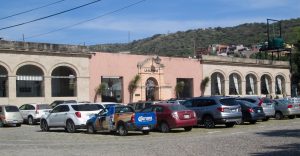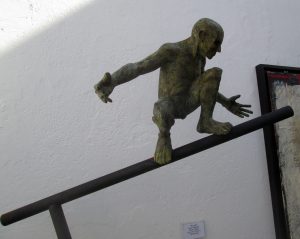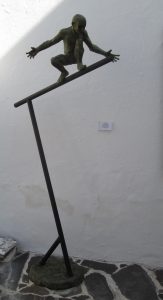It’s fun, I think, to play a little private game whenever I visit art galleries. First, I pretend I have money. Then, quietly humming to myself my adaptation of the “Fiddler on the Roof” tune, “If I were a rich girl,” I roam around, seeking out one – just one — of the works of art for sale that I simply cannot live without. (This imaginary game is something of a love quest.) Then I ask myself: Just what is it about this piece that speaks to me and captivates me so? And: Why have I fallen in love with it?
Last Sunday my friend Suzanne and I decided to spend the beautiful, sunny, mild afternoon strolling through San Miguel de Allende’s grand center of art and design, Fabrica La Aurora, the fully renovated early twentieth century textile mill now housing world-class cafes, chic shops, and close to two dozen contemporary art galleries featuring works by Mexican as well as international artists.


Considered one of San Miguel’s top tourist destinations, it’s a place to visit when you think you’re looking pretty chic yourself and you’re prepared to pretend you have money to spend. As Suzanne and I wandered from gallery to gallery, observing, admiring, and commenting, I could hear my mother’s early admonitions in my head: “Shoulders back. Head up. Walk tall. Look rich.” And I had to smile.
And then I saw it – the piece I would buy if I could afford it (and if I had a place to put it): a tall, bronze sculpture by the acclaimed Mexican artist, Ignacio Manteca, of a man balancing precariously on a high beam that leads upward to – God knows where.
“This is my view of life,” I said to Suzanne, who’s known me since grammar school in suburban New Jersey. She didn’t seem surprised.

For many years I’ve thought that if I were an artist who painted confidently in oils on large canvases (instead of a rank dabbler in small watercolors), I would depict life this way: a tiny person walking on a long tightrope high above a nameless expanse with only the sky above and a thin, horizontal balancing rod in his (or her) hands. The high wire goes up, on an angle, from the lower left to the upper right of the canvas. To what? The unknown.
I’ve never tried, but I know how I would paint this abstraction: Beneath the high wire would be a rough patchwork in thick, earthy browns and greens, reminiscent of the view one sees from an airplane shortly after takeoff, before the plane cuts through cloud cover. Above the high wire I’d paint with a wide, flat brush flashes of purples and pinks – unpredictable weather – over which I’d draw in loopy calligraphy, like the faint outline of clouds, dotted with birds, the Arabic word “balance.”
Why do I love this Manteca sculpture? Because it is the closest I’ve ever come to seeing an artist’s rendition of what I’ve seen in my mind for so long.
This is the purpose of artists, I feel: to express for others what those others would express themselves if they could. And not, of course, only in paints or bronze, but also in music, dance, drama, poetry and literature. All of the arts. All of them have the power at times to speak to our often-inarticulate hearts.
The other day I checked out more large-print books from our beloved Biblioteca here in San Miguel to tide me through the holiday season. One is the late Pat Conroy’s memoir My Reading Life. I copied this short passage from his chapter, “Why I Write,” because it resonated deeply with me and I needed to share it now with you:
“From the very beginning, I wrote to explain my own life to myself, and I invited readers who chose to make the journey with me to join me on the high wire.”
Yes.
~ ~ ~
(For more about the Fabrica La Aurora Center of Art and Design in San Miguel de Allende, please visit www.fabricalaaurora.com .)


